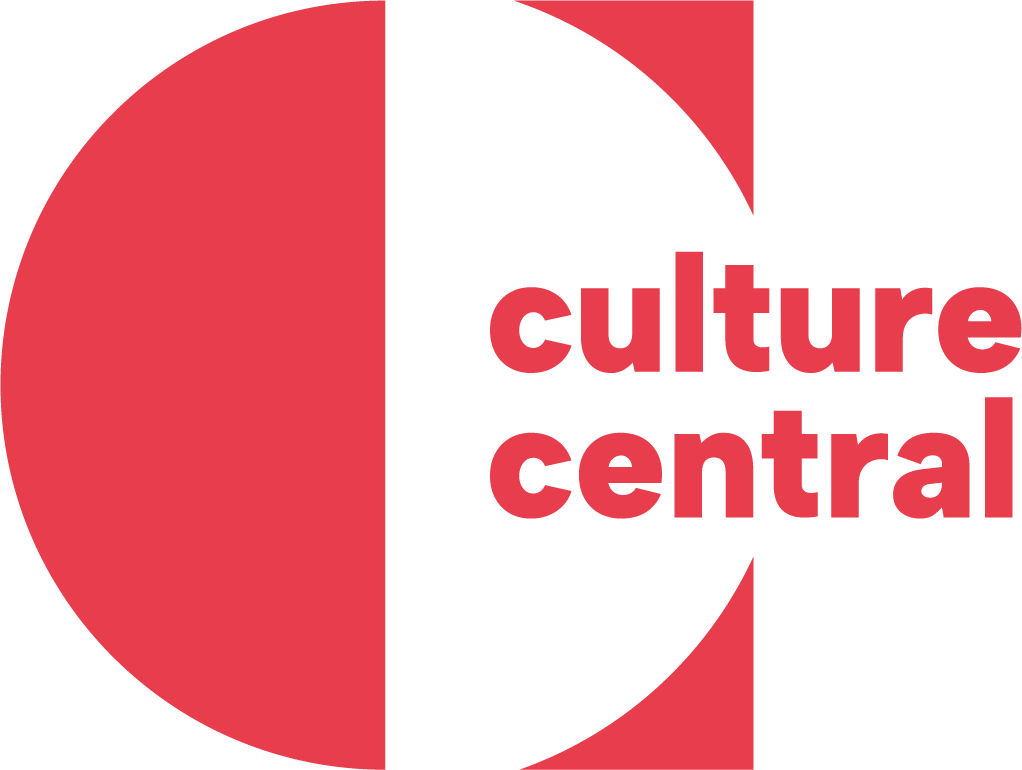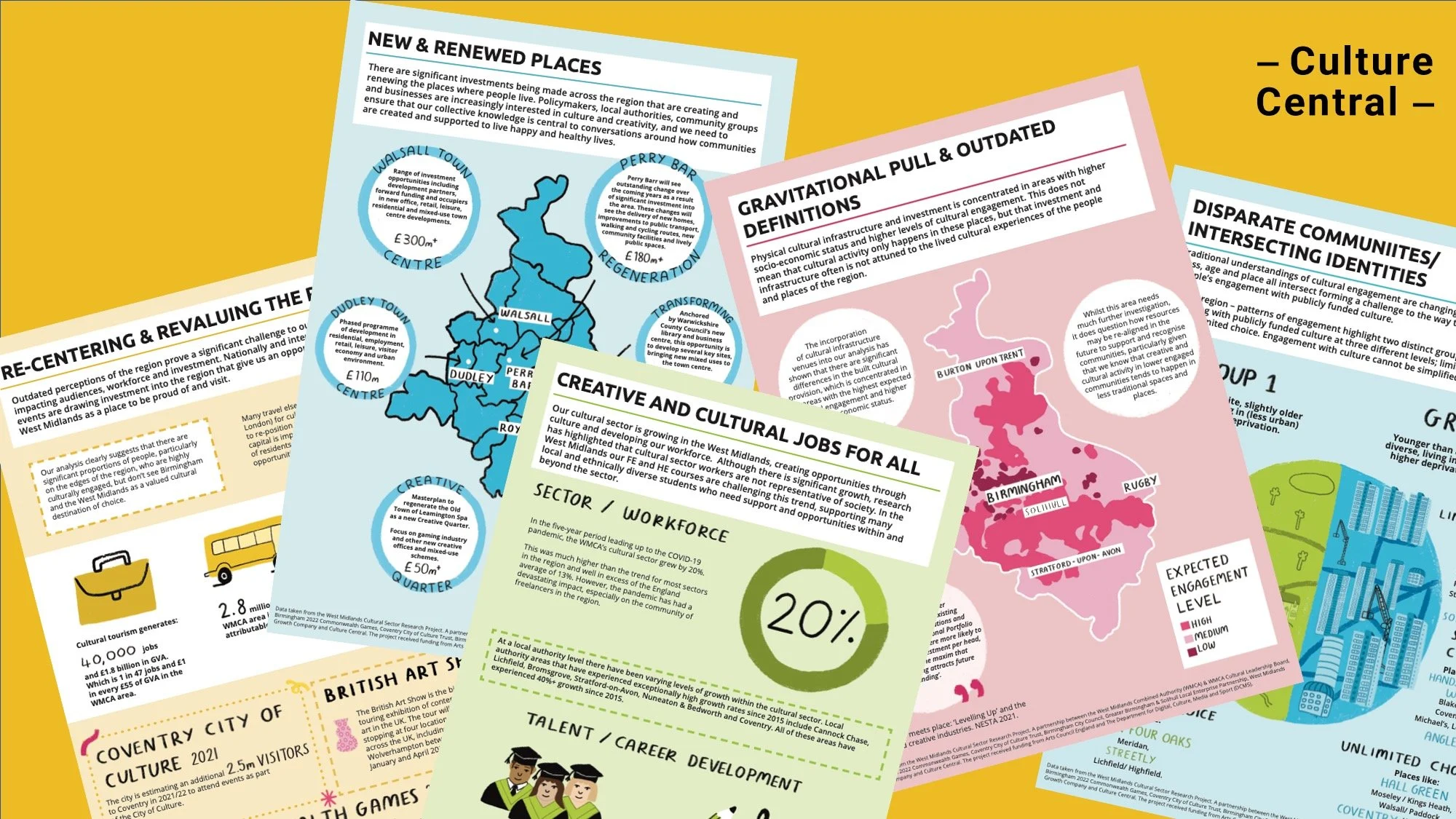West Midlands Cultural Sector Research Project: What have we have learnt and what should our future be?
Culture Central, Birmingham 2022, Coventry City of Culture, and the West Midlands Combined Authority recently invited strategic leaders and partners from across the region to discuss how the findings from the recent West Midlands Cultural Sector Research Project impact on the future of creativity and culture in the West Midlands.
At this pivotal moment for our region, assessing the impact of Covid-19, we spoke to members, cultural organisations, and key stakeholders to help us think about the collective future of the cultural sector and reflect on how we can create opportunities through culture for the people and places of the region.
You can download the slides here and view a recording of the hybrid event here:
The event focused on a series of infographics (which you can download here), and accompanying provocations developed by Culture Central, and based on the research project.
These infographics spoke to a number of regional priorities:
RE-CENTERING & REVALUING THE REGION
Outdated perceptions of the region prove a significant challenge to our collective future, impacting audiences, workforce and investment. Nationally and internationally significant events are drawing investment into the region that gives us an opportunity to rethink the West Midlands as a place to be proud of and visit.
Provocation: Chenine Bhathena, Creative Director, Coventry UK City of Culture 2021
Raidene Carter, Executive Producer, Cultural Programme & Live Sites, Birmingham 2022 Commonwealth Games
Jonothan Neelands, Academic Director, Cultural Partnerships, University of Warwick
NEW & RENEWED PLACES
There are significant investments being made across the region that are creating and renewing the places where people live. Policymakers, local authorities, community groups and businesses are increasingly interested in culture and creativity, and we need to ensure that our collective knowledge is central to conversations around how communities are created and supported to live happy and healthy lives.
Provocation: Geraldine Collinge, Director of Creative Placemaking and Public Programmes, Royal Shakespeare Company (PDF)
CREATIVE AND CULTURAL JOBS FOR ALL
Our cultural sector is growing in the West Midlands, creating opportunities through culture and developing our workforce. Although there is significant growth, research has highlighted that cultural sector workers are not representative of society. In the West Midlands our FE and HE courses are challenging this trend, supporting many local and ethnically diverse students who need support and opportunities within and beyond the sector.
Provocation: Dr Karen Patel, Research Fellow, Birmingham City University (PDF)
GRAVITATIONAL PULL & OUTDATED DEFINITIONS
Physical cultural infrastructure and investment is concentrated in areas with higher socio-economic status and higher levels of cultural engagement. This does not mean that cultural activity only happens in these places, but that investment and infrastructure often is not attuned to the lived cultural experiences of the people and places of the region.
Provocation: Martin Cox, Freelance Artist & Researcher (PDF)
What happened and what next?
We looked at the key findings from the West Midlands Cultural Sector Research Project and reflected on the provocations to explore what areas we need to work together on with the ultimate aim of informing a collective Cultural vision and narrative for our future.
Together we spoke about the following priorities:
Prioritising communications – to ensure a strong regional narrative that the region is a place for people to be proud of. We’ve seen that working together – through things like the Cultural Response Unit, Birmingham 2022 and Coventry City of Culture give us an opportunity to redefine the narrative of the West Midlands to one that is owned and valued by the people and places of the region.
Longer-term symbiotic partnerships and collaborations – building on and developing new and unusual partnerships, particularly with voluntary and community organisations to generate innovative and responsive ways of working that challenge existing ways of working.
Building on the gaps in data and research – We need to use the data and research that we have now, but understand the impacts of Covid-19 as well as expanding our knowledge of the whole region.
We need to continue our conversations about definitions of culture, and unpick the sector's definitions of culture to be more representative of peoples lived experiences of culture and creativity in the region.
We need to continue to support and invest in the capacity of the cultural sector workforce, especially freelancers to ensure that the region is a great place to work but also to develop and grow.
We need to continue the work that organisations are undertaking around creating a more equitable sector, developing work such as More Than A Moment as well as including more intersectional approaches to equity that represent the people and places of the region.
This event represented a starting point for us, and we want to continue the collaborative and open ways of working we’ve all developed over the past eighteen months. If you’ve got any ideas or questions about the event, please drop us an email at info@culturecentral.co.uk.
We would love to hear from you.

